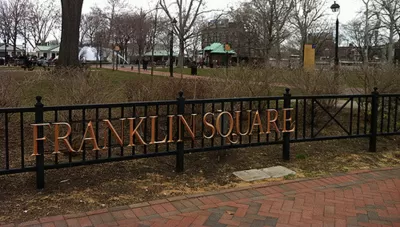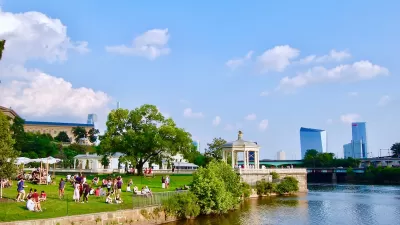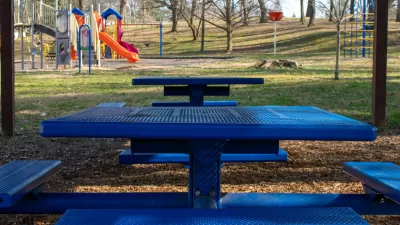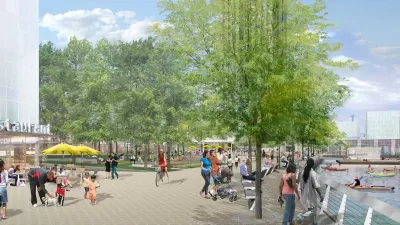Philadelphia's Franklin Square will require admission in the evening this spring, for the duration on a Chinese lantern festival. A critic faults the "philosophy of privatism" for robbing the park of its democratic qualities.

Philadelphia Inquirer Architecture Critic Inga Saffron establishes the stakes in a controversy over an ongoing festival in Franklin Square:
Urban parks are the physical embodiment of our democratic system, maybe the only place in our increasingly lopsided society where rich and poor can come together as equals. Anyone can walk into an urban park, sit on a bench, and enjoy the sunshine, gratis. At least, that's how it is supposed to work.
Those ideals run counter to the current state of Franklin Square, according to Saffron, which until June 12 is surrounded by a chain-link fence and a black curtain. "The enclosure, which looks like something you would find at a top-secret construction site, was installed last week so the park's nonprofit manager, Historic Philadelphia Inc., could lease the public square to a private company for a nightly Chinese lantern festival," explains Saffron.
Saffron argues that "parks exist to provide city-dwellers with a green respite, not do yeoman's work for the economy" before providing a brief history of how it came to be that cities turned parks into test beds for public-private partnerships.
Stephen Salisbury, culture writer for the Inquirer, also wrote about the event's effects in Franklin Square earlier in April.
FULL STORY: Changing Skyline: The public cost of privatizing Philadelphia's parks

Planetizen Federal Action Tracker
A weekly monitor of how Trump’s orders and actions are impacting planners and planning in America.

San Francisco's School District Spent $105M To Build Affordable Housing for Teachers — And That's Just the Beginning
SFUSD joins a growing list of school districts using their land holdings to address housing affordability challenges faced by their own employees.

The Tiny, Adorable $7,000 Car Turning Japan Onto EVs
The single seat Mibot charges from a regular plug as quickly as an iPad, and is about half the price of an average EV.

Trump Approves Futuristic Automated Texas-Mexico Cargo Corridor
The project could remove tens of thousands of commercial trucks from roadways.

Austin's First Single Stair Apartment Building is Officially Underway
Eliminating the requirement for two staircases in multi-story residential buildings lets developers use smaller lots and more flexible designs to create denser housing.

Atlanta Bus System Redesign Will Nearly Triple Access
MARTA's Next Gen Bus Network will retool over 100 bus routes, expand frequent service.
Urban Design for Planners 1: Software Tools
This six-course series explores essential urban design concepts using open source software and equips planners with the tools they need to participate fully in the urban design process.
Planning for Universal Design
Learn the tools for implementing Universal Design in planning regulations.
Smith Gee Studio
City of Charlotte
City of Camden Redevelopment Agency
City of Astoria
Transportation Research & Education Center (TREC) at Portland State University
US High Speed Rail Association
City of Camden Redevelopment Agency
Municipality of Princeton (NJ)





























